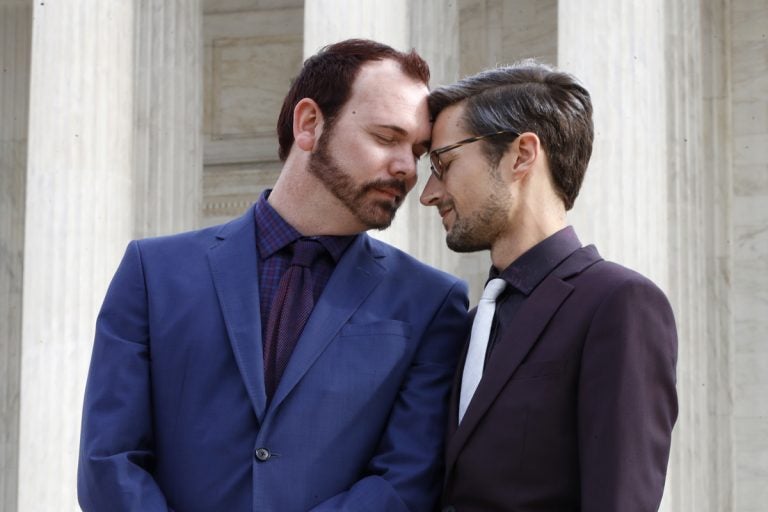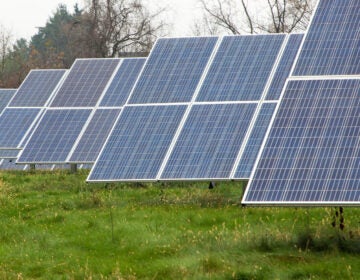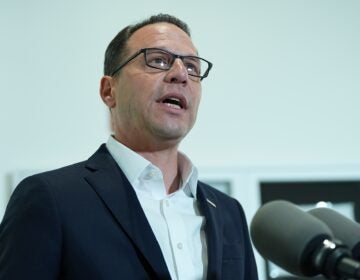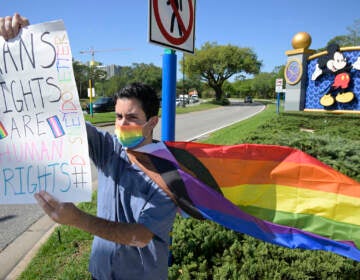This gay-rights ruling should (but won’t) be a piece of cake
The Masterpiece Cakeshop case will hinge on Justice Kennedy. Even though he was pivotal in legalizing gay marriage, he's clearly not happy with how the baker has been treated.

Charlie Craig, left, and David Mullins touch foreheads after leaving the Supreme Court which is hearing the case, the 'Masterpiece Cakeshop v. Colorado Civil Rights Commission' today, Tuesday, Dec. 5, 2017, in Washington. (AP Photo/Jacquelyn Martin)
If you strip away the abstruse arguments that dominated yesterday’s Supreme Court hearing in the wedding cake case, the gist of the issue is simple: Two gay guys in Colorado were refused service because they were gay.
And the decision, due next June, should be a slam dunk: When a business open to the public offers a service, it should be compelled to offer it on an equal basis to all. And if a proprietor tries to justify refusal with a religious rationale — insisting, for instance, that baking a wedding cake for a gay couple would supposedly offend Jesus — the proprietor of a public business should be duly reminded that the right to religious freedom doesn’t give him the right to discriminate.
But I doubt that the latest confrontation in America’s culture war will produce such a ruling. Masterpiece Cakeshop v. Colorado Civil Rights Commission will hinge on swing-voter Anthony Kennedy, and even though this Reagan appointee was pivotal in legalizing gay marriage, he’s clearly not happy with how the religious baker has been treated.
With four liberal justices poised to support the gay couple (Charlie Craig and Dave Mullins) and four conservative justices poised to support the Masterpiece baker (Jack Phillips), Kennedy is one powerful dude. Nothing new there, in this era of 5-4 rulings. It’s his world; we only live in it. And Phillips’ lawyers know this, because they tailored their arguments for Kennedy’s ears.
It’s obvious that Phillips refused for religious reasons to bake the guys a cake; as he stated in a TV interview, “I don’t believe that Jesus would have made a cake if he had been a baker,” which brings to mind the southern segregationist restaurant owners who, 50 years ago, invoked Jesus when they refused service to black customers. And even if Phillips’ contention about Jesus was provably true, there’s a line in Matthew 5:32 where Jesus denounces divorce and equates second marriages with adultery. Where’s the evidence that Phillips refuses to bake wedding cakes for remarried straight couples?
But Phillips’ lawyers wisely decided not to fight in the high court on religious grounds; they knew that Kennedy, having cast the ’15 pivotal vote for gay marriage and having framed it as an equality issue, would not necessarily endorse a religious right to selectively discriminate. So yesterday they spin it as a free speech case, arguing that the baker is an artist whose rights to artistic expression were being violated. And it just so happens that Kennedy is one of the court’s most vocal champions of free speech.
Does baking a cake really qualify as speech? Hey, lawyers can argue anything.
These lawyers said that when the Colorado Civil Rights Commission ruled against Phillips (as did the state’s highest court, because Colorado has a law that bars businesses from discriminating against gay people), it was tantamount to oppressing the baker’s artistry. And thus is a violation of the baker’s First Amendment rights. Or something like that.
Some of the justices quickly saw the flaw in that spin, pointing out that if a cake baker is really a free-speech artist, then surely a tailor or a jeweler or a caterer who refuses to serve a gay couple for religious reasons can instead claim to be a free-speech artist. Sonia Sotomatyor scoffed that a major sandwich chain could therefore refuse to serve gay people, claiming that their employees are “sandwich artists.”
But Kennedy voiced sympathy for the baker’s plight in one key respect: When Colorado’s civil rights commission ruled for the gay couple, it instructed Phillips to give equal-rights training to his workers. Kennedy suggested that the instruction violated Phillips’ right of free expression. Kennedy told Colorado’s lawyer: “Counselor, tolerance is essential in a free society. And tolerance is most meaningful when it’s mutual. It seems to me that the state in its position here has been neither tolerant nor respectful of Phillips’ religious beliefs.”
That doesn’t necessarily mean Kennedy will swing to the baker — and, by extension, rule for all businesses nationwide that might want to discriminate against gay couples. During oral argument, the justices play devil’s advocate all the time. And Kennedy did the same with the bakers’ lawyers (including the Trump administration’s lawyer); at one point, he suggested that ruling for Phillips was akin to putting a sign in the baker’s window, “we do not bake cakes for gay weddings” — which Kennedy said would be “an affront to the gay community.”
So this decision looks like a coin flip. Right now, 22 states prohibit public-accommodation businesses from discriminating against gays, and those laws may hinge on which way Kennedy tilts. But lest we forget, this ruling probably wouldn’t hinge on Kennedy at all if Mitch McConnell hasn’t stolen Antonin Scalia’s vacated seat by denying Obama nominee Merrick Garland the right to a confirmation hearing and vote. Neil Gorsuch sits in that seat because religious conservatives saw Donald Trump as their best shot to tilt the court rightward.
Elections have consequences. And the culture war rages on.
WHYY is your source for fact-based, in-depth journalism and information. As a nonprofit organization, we rely on financial support from readers like you. Please give today.




